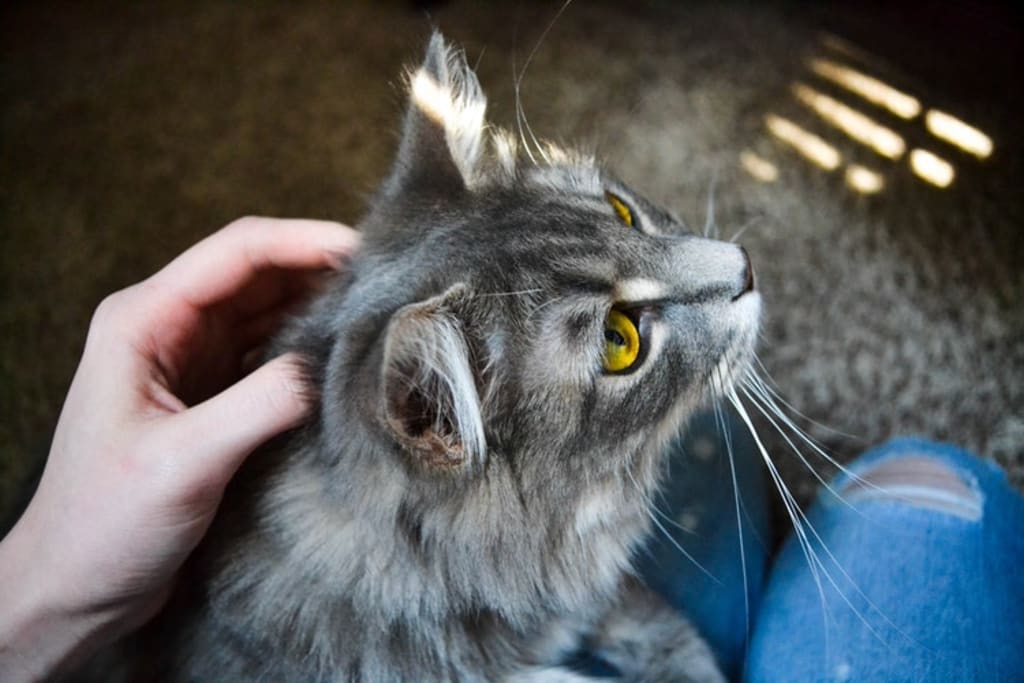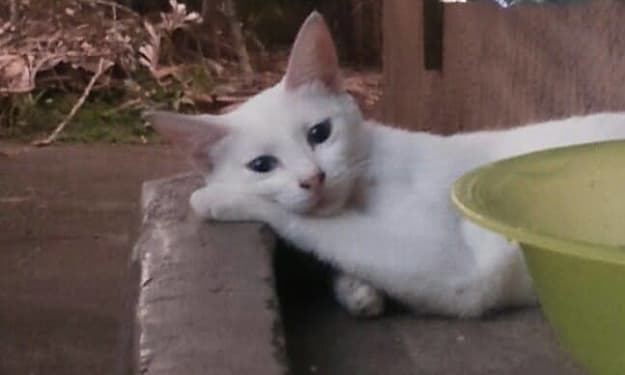Time, Patience, and Cuddles
The Rewarding Journey of a Cat Socialiser

She cowers in the corner, surrounded by her plush igloo—her safety zone. She most likely will remain huddled inside it until the visitors leave, the lights are dimmed, and the staff go home. Only then will she dare to move, darting out from her igloo and straight to her food dish and water bowl.
Since she arrived at the cat sanctuary, she has done her best to avoid human contact. In all honesty, it is understandable.
She once had a home with a family that adored her. She was played with, fussed over, fed, and most importantly, loved.
Or so she thought.
Then one day, ten years after she joined her human family as a kitten, she found herself left behind. Her family had moved house and set her free—free to fend for herself.
She soon found herself hungry, cold, and scared. For some reason, people—people she'd never seen before—were trying to catch her. She quickly became tired of running, though. All she wanted was her family, her warm, cosy bed, and her meat bits in gravy.
Eventually, she gave in to the chase.
Here at the cat sanctuary, she is warm, dry, and cared for. But she is still confused, scared, and sometimes she lashes out—a shadow of her former self.
People come and look at her and say how pretty she is, but her hissy growls and her fast front left paw hook mean that they don’t fuss over her for long. They move on to another enclosure and consider the curious kittens instead.
Today is going to be different, though. Today, I’m here.
I’m here as a volunteer cat socialiser. I will quietly step into her enclosure, sit down on the floor next to the occupied igloo, and tell this frightened creature before me how lovely she is. Sure, she won’t understand what I’m saying, but my gentle voice will greet her with the kindness and warmth that she needs.
Chances are I won’t see much of her, just two glowing eyes staring back at me from within her dark igloo. I’ll slowly move my hand next to the igloo’s opening. She’ll hiss and warn me that she doesn’t want to be stroked. I'll respect her request and retreat.
Most likely, she's actually longing for some human compassion. She just doesn’t know if she can trust me yet. People often mistake a hiss for viciousness and anger, when it’s really just a simple way of saying, “I’m scared.”
On the off chance that she ventures from her hideaway, I have a few toys on hand that will hopefully pique her interest. Perhaps a distraction such as this will allow her to forget where she is, and she’ll pounce on the fuzzy pipe cleaner or happily bat her paw at the toy mouse for a few minutes. She’ll roll onto her back, kick the toy with her back legs, and meow in delight.
But then reality will set in and she’ll dash back to her corner and hide. I’ve seen it before and sadly, I know I’ll see it again.
If I could, I’d spend every day with her and the other cats that are here in the same situation. I’d offer them plenty of strokes, a warm lap to sit on, a chance to play, and especially for those who have found their transition to sanctuary life difficult and scary…well, I’d offer them my patience and love.
Not all the cats who arrive here are shy and scared, but those that are need lots of time to come out of their shell and thrive again. Some of them were abandoned and found on the street. Others lost their owner through bereavement. Some were said to have triggered a family member’s asthma attack. One didn't get along with the family dog.
Then there are those young feral cats who were born in a factory warehouse. They’ve never known the kindness of humans, the comfort of a sofa, or the warmth of a glowing fireplace. Cat socialising gives them the chance to learn that people aren't that bad after all and the confidence to trust.
According to Cats Protection, there are approximately one to two million stray cats in the UK. Each year, an estimated 150,000 are taken into shelter care.
Catchat.org is a charity, founded in 2003, that helps 8,000 cats annually to find a new home. They feature approximately 1,300 UK rescue centres on their web page, and it is regularly updated with new cats needing homes.
Some of the shelters are smaller branches of national cat charities, while others are small, independent shelters and sanctuaries working tirelessly to keep up with the constant demand for care. Volunteers are the key to ensuring that a shelter runs smoothly, while the staff—often a small team—deal with the day-to-day operations and administration.
...And so here I sit, at my local cat sanctuary—in my little corner of the world—waiting for this frightened girl to take a chance with me. As she leans her head forward, I can see her whiskers quiver as I offer her my hand again. Her eyes are round and wide. Mine are filled with hope. I smile at her and surprisingly, she squints her eyes at me in return.
A cat smile. That’s a good start.
Throughout the week, other cat socialisers will be here voluntarily, giving these needy felines their attention and their time. Some of the cats will get lucky and become reserved within days. For others, especially the scared and reclusive ones, it can take weeks and even months to find a new home. Socialising doesn't only help those who are timid and agitated, but it also helps ensure that those who are happy remain stimulated and in good spirits.
When I leave this girl today, I will say goodbye to her with the hope that she will have found a home by the next time I return. Sadly, chances are that she won't—her current nature and her age are obstacles when it comes to rehoming.
So each time I visit, I will continue to coax her out of her shell. I'll talk to her, sit close to her, remind her how lovely it is to be touched, and attempt to erase the confusion and fear that the change in environment instilled in her.
It is rewarding to see the difference a few weeks can make—slow but steady.
One day when I arrive, she won't be hiding in her igloo anymore. Instead, I'll find her sitting proudly on her windowsill. She'll greet me with a meow and a purr and I'll return that greeting with a hug and some strokes.
And then, just then, as I'm about to spend more time with her, I'll turn around and find that her new family has arrived. They'll be standing outside her enclosure, cat carrier in hand, excitedly anticipating their journey home together.
Yes, my heart will break because it's hard not to get attached. I'll quickly bat my eyelids and fight back the tears. But as much as I'll miss this girl who has weaved her way into my life, I am thrilled that she has found a new home and that I played a role in changing her life.
As she is carried down the corridor by her new family, I'll quietly slip into the next enclosure, smile at the new timid face that greets me, reach out my hand ... and start again.
If you have a few hours to spare, then contact your local cat rescue centre and offer your time as a cat socialiser. Catchat.org has a listing of cat shelters by county for reference. Volunteering offers the satisfaction of making a difference to someone in need and the rewards will last a lifetime.
About the Creator
Kathryn Calvert
Kathryn is a freelance writer, editor, & children's author based in Manchester, UK. She loves theatre, music, volunteering at her local cat shelter, and spending time with her husband, daughter, and eight cats.







Comments
There are no comments for this story
Be the first to respond and start the conversation.